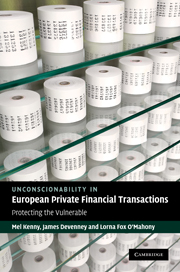Book contents
- Frontmatter
- Contents
- List of contributors
- Introduction: conceptualising unconscionability in Europe
- PART I Conceptualising unconscionability
- 1 Freedom of contract as freedom from unconscionable contracts
- 2 Protection of weaker parties in English law
- 3 Freedom of contract, unequal bargaining power and consumer law on unconscionability
- 4 Loyalty as a tool to combat contractual unfairness: a French perspective
- 5 Unconscionability and the value of choice
- 6 From individual conduct to transactional risk: some relational thoughts about unconscionability and regulation
- 7 An economic perspective on legal remedies for unconscionable contracts
- PART II Conceptualising unconscionability in financial transactions
- Conclusions
- Index
- References
4 - Loyalty as a tool to combat contractual unfairness: a French perspective
from PART I - Conceptualising unconscionability
Published online by Cambridge University Press: 06 August 2010
- Frontmatter
- Contents
- List of contributors
- Introduction: conceptualising unconscionability in Europe
- PART I Conceptualising unconscionability
- 1 Freedom of contract as freedom from unconscionable contracts
- 2 Protection of weaker parties in English law
- 3 Freedom of contract, unequal bargaining power and consumer law on unconscionability
- 4 Loyalty as a tool to combat contractual unfairness: a French perspective
- 5 Unconscionability and the value of choice
- 6 From individual conduct to transactional risk: some relational thoughts about unconscionability and regulation
- 7 An economic perspective on legal remedies for unconscionable contracts
- PART II Conceptualising unconscionability in financial transactions
- Conclusions
- Index
- References
Summary
Introduction
French law does not have a general doctrine of unconscionability per se, i.e. as it exists in the American Uniform Commercial Code. Yet, if one considers the concept as an expression of contractual unfairness, then, it is clearly present in French law, not only through various mechanisms in the civil code, but, also through the way the courts have used loyalty as a device to re-establish some balance between the parties. The aim of this chapter is therefore to consider such measures and explore loyalty, as a facet of the wider notion of good faith in order to see how it has developed as a tool to combat contractual unfairness and whether it is still effective in doing so. This will be done in three parts: in the first part, we will consider some of the measures in place in French law which arguably deal with contractual unfairness i.e. la lésion, la cause and the legislation on consumer contracts.
The second part will concentrate on one specific area, that of pre-contractual fraud, la réticence dolosive. The focus on this notion is motivated by the fact that it is an area where the efforts of the courts to use loyalty as a tool to combat unfairness appear to be at their most obvious and therefore the similarities with that aspect of unconscionability at their strongest. Yet, we will also show how this tendency appears to be in retreat in recent judicial developments.
- Type
- Chapter
- Information
- Unconscionability in European Private Financial TransactionsProtecting the Vulnerable, pp. 62 - 78Publisher: Cambridge University PressPrint publication year: 2010



